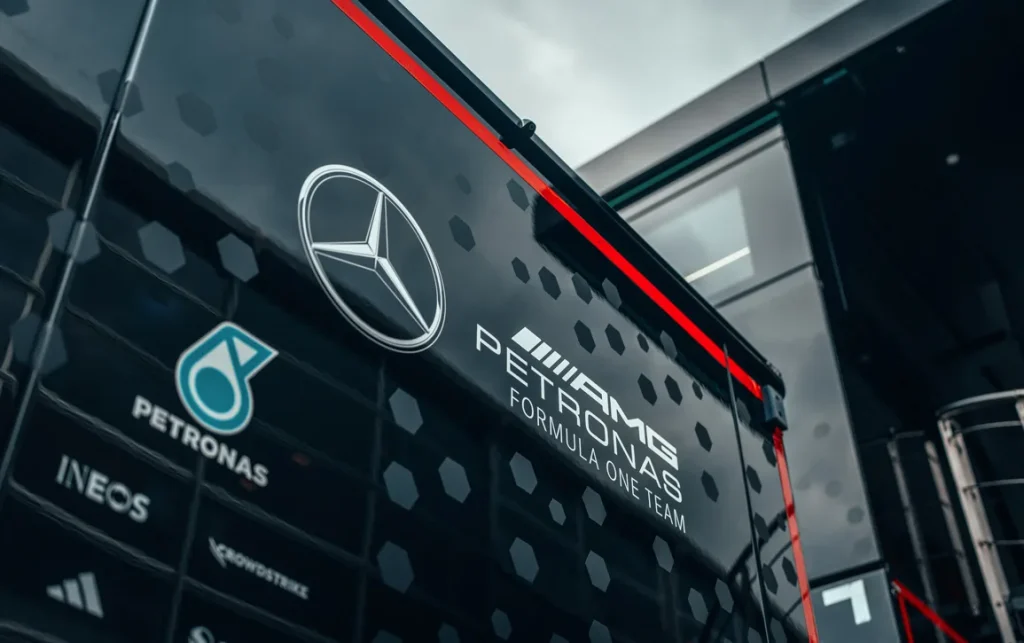Mercedes F1 Nears Net Zero Goal with 99% Biofuel Logistics Coverage Across Europe

- Mercedes-AMG Petronas Formula One achieved 99% HVO100 biofuel coverage in its 2025 European season logistics, cutting lifecycle emissions by up to 81%.
- The team’s logistics avoided more than 1,190 tonnes of CO₂e since adopting HVO100 in 2022.
- The next phase expands biofuel and electric truck integration beyond Europe as Formula 1 advances toward Net Zero by 2030.
Mercedes Pushes Decarbonization Beyond the Track
The Mercedes-AMG Petronas Formula One Team confirmed it achieved 99% HVO100 biofuel coverage for its 2025 European race and marketing logistics, a milestone that positions the team at the forefront of motorsport decarbonization.
The Brackley-based team has been transitioning its internal combustion engine (ICE) truck fleet to hydrotreated vegetable oil (HVO100) since 2022. The second-generation biofuel, made from renewable feedstocks, cuts lifecycle emissions by as much as 81% compared with standard diesel and requires no engine modification.
Mercedes said its adoption of HVO100 has already avoided more than 1,190 tonnes of CO₂e across its European operations since the initial pilot phase. The 2025 season marks the first time the team’s entire logistics network, covering races, hospitality, and marketing operations, has reached near-total biofuel coverage.
“Our sustainability strategy is built on innovation on and off the track,” said Alice Ashpitel, Head of Sustainability at Mercedes-AMG Petronas F1. “Every kilometre travelled using biofuel moves us closer to Net Zero by 2040, demonstrating our commitment to sustainable high performance.”

Logistics as a Testbed for Sustainable Engineering
Formula 1 logistics have traditionally represented a substantial portion of teams’ carbon footprints, from freight transport to trackside operations. Mercedes’ shift toward HVO100 is part of a wider strategy that sees racing as a test lab for scalable decarbonisation technologies.
The biofuel programme has been supported by PETRONAS, Mercedes’ title and technical partner, and its logistics suppliers across Europe. HVO100’s ability to function as a “drop-in” replacement for diesel has allowed the team to transition its truck fleet without structural modifications—critical in a high-performance industry where reliability and timing are non-negotiable.
Beyond emissions reduction, the use of HVO100 supports the EU’s Renewable Energy Directive targets for transport fuels and reflects growing adoption among logistics and manufacturing sectors seeking compliance with Scope 3 decarbonisation goals.
The next step involves expanding HVO100 coverage to races outside Europe, where fuel infrastructure is more limited, and integrating electric vehicle (EV) logistics into the team’s operations.
Electric Fleet Integration Gains Traction
Mercedes-Benz Trucks’ eActros 600 made its Formula 1 debut this season, completing a 673-kilometre journey from Brackley to Zandvoort for the Dutch Grand Prix. The electric truck transported the team’s W16 race cars, demonstrating the viability of long-distance EV logistics for elite motorsport operations.
The eActros 600, designed for heavy-duty freight, reduces lifecycle CO₂ emissions by up to 80% compared with diesel trucks. Rapid charging infrastructure and range efficiency are being tested to evaluate broader deployment across Mercedes’ European logistics in future seasons.
Ashpitel said the integration of HVO100 and electric freight represents a “hybrid model of sustainable logistics” that mirrors the team’s engineering philosophy: continuous innovation through performance optimisation.
RELATED ARTICLE: Mercedes to Debut Sustainable Carbon Fibre Composites in 2025 F1 Car
Formula 1’s Broader Sustainability Drive
Formula 1’s governing body, the FIA, and commercial rights holder Liberty Media have committed to achieving Net Zero by 2030 across the sport’s operations. Measures include adopting 100% sustainable fuels for all cars, transitioning to renewable energy at circuits, and reducing freight-related emissions—among the sport’s most challenging targets.
“Formula 1 has always been synonymous with innovation and the desire to improve,” said F1 CEO Stefano Domenicali. “We’ve shown that sustainable development is possible while continuing to grow globally. The use of advanced sustainable fuels in all F1 cars from next year will also open opportunities for road transport.”

For Mercedes, the alignment of sport and sustainability is increasingly strategic. The team aims for Net Zero Race Team Control emissions by 2030 and full Net Zero across all scopes by 2040—an ambition that places it ahead of most global sports organisations in setting time-bound, science-based climate targets.
Broader Implications for ESG and Industry
For investors and sustainability executives, Mercedes’ logistics transition offers a case study in applied ESG within a high-emission, high-performance sector. The programme demonstrates how innovation and decarbonisation can be achieved without compromising reliability or brand performance—an insight relevant for heavy transport, logistics, and manufacturing industries facing regulatory and market pressure to decarbonise.
By treating its race operations as a “test lab,” Mercedes has effectively accelerated R&D deployment for sustainable fuels and electric mobility technologies that can scale beyond motorsport. The blend of policy alignment, private innovation, and visible results positions Formula 1 as a unique proving ground for the transport sector’s low-carbon transition.
As Mercedes prepares to expand biofuel and electric truck integration beyond Europe, the team’s experiment in sustainable logistics may prove as influential to the future of clean transport as its performance innovations have been to racing.
Follow ESG News on LinkedIn












